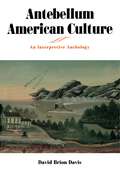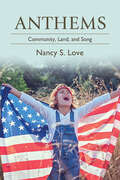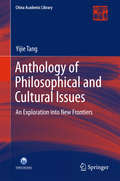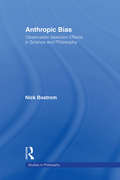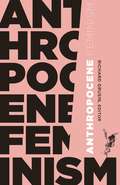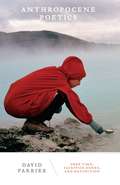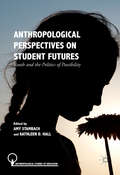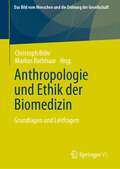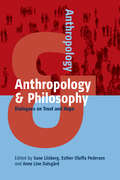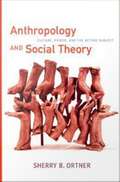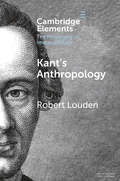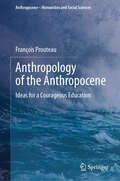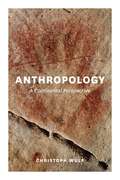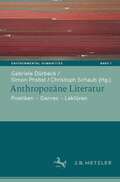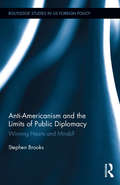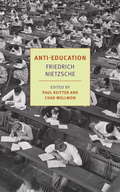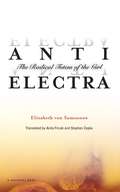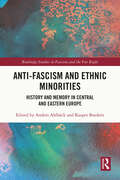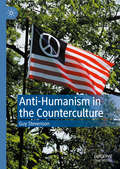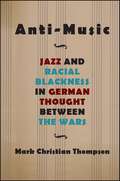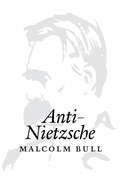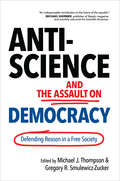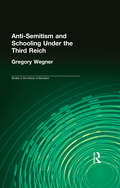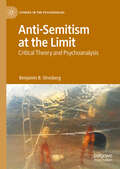- Table View
- List View
Antebellum American Culture: An Interpretive Anthology
by David Brion DavisFirst published in 1979, this volume offers students and teachers a unique view of American history prior to the Civil War. Distinguished historian David Brion Davis has chosen a diverse array of primary sources that show the actual concerns, hopes, fears, and understandings of ordinary antebellum Americans. He places these sources within a clear interpretive narrative that brings the documents to life and highlights themes that social and cultural historians have brought to our attention in recent years. Beginning with the family and the issue of socialization and influence, the units move on to struggles over access to wealth and power; the plight of "outsiders" in an "open" society; and ideals of progress, perfection, and mission. The reader of this volume hears a great diversity of voices but also grasps the unities that survived even the Civil War.
Anthems: Community, Land, and Song (SUNY series in New Political Science)
by Nancy S. LoveAn examination of struggles for national sovereignty and social justice as seen through patriotic anthems and songs of resistance.Anthems are songs of loyalty and devotion with religious or quasi-religious meanings, typically associated with nation-states. Singing patriotic songs together encourages a sense of shared identity and unified community among citizens. Anthems compares traditional American anthems, such as "The Star-Spangled Banner" and "America the Beautiful," with anthems of resistance from contemporary social movements, such as Occupy Wall Street, Black Lives Matter, and Standing Rock. Although seldom fully recognized by political scientists, musical song plays a significant role in struggles for national unity and social justice. While America's national anthems celebrate a unitary (white) nation, these alternative anthems challenge the definition of sovereignty as property that characterizes modern Western democracies. They offer an alternative vision of a multicultural democracy still struggling to emerge. Written from an interdisciplinary perspective on culture, economics, and politics best described as critical theory, Anthems is intended for scholars, students, and, most important, citizens.
Anthology of Philosophical and Cultural Issues: An exploration into new frontiers (China Academic Library)
by Yijie TangThis book argues that a general understanding of traditional Chinese philosophy can be achieved by a concise elaboration of its truth, goodness and beauty; that goodness and beauty in Chinese philosophy, combined with the integration of man and heaven, knowledge and practice, scenery and feeling, reflect a pursuit of an ideal goal in traditional Chinese philosophy characterized by the thought mode uniting man and nature. This book also discusses the anti-traditionalism of the May Fourth Movement, explaining that the true value of "sagacity theory" in traditional Chinese philosophy, especially in Neo-Confucianism in the Song and Ming dynasties, lies in its insights into universal life. In addition, existing ideas, issues, terminologies, concepts, and logic of Chinese philosophical thought were actually shaped by Western philosophy. It is necessary to be alienated from traditional status for the creation of a viable "Chinese philosophy. " "Modern Chinese philosophy" in the 1930s and 1940s was comprised of scholarly work that characteristically continued rather than followed the traditional discourse of Chinese philosophy. That is to say, in the process of studying and adapting Western philosophy, Chinese philosophers transformed Chinese philosophy from traditional to modern. In the end of the book, the author puts forward the idea of a "New Axial Age. " He emphasizes that the rejuvenation of Chinese culture we endeavor to pursue has to be deeply rooted in our mainstream culture with universal values incorporating cultures of other nations, especially the cultural essence of the West.
Anthropic Bias: Observation Selection Effects in Science and Philosophy
by Nick BostromAnthropic Bias explores how to reason when you suspect that your evidence is biased by "observation selection effects"--that is, evidence that has been filtered by the precondition that there be some suitably positioned observer to "have" the evidence. This conundrum--sometimes alluded to as "the anthropic principle," "self-locating belief," or "indexical information"--turns out to be a surprisingly perplexing and intellectually stimulating challenge, one abounding with important implications for many areas in science and philosophy. There are the philosophical thought experiments and paradoxes: the Doomsday Argument; Sleeping Beauty; the Presumptuous Philosopher; Adam & Eve; the Absent-Minded Driver; the Shooting Room. And there are the applications in contemporary science: cosmology ("How many universes are there?", "Why does the universe appear fine-tuned for life?"); evolutionary theory ("How improbable was the evolution of intelligent life on our planet?"); the problem of time's arrow ("Can it be given a thermodynamic explanation?"); quantum physics ("How can the many-worlds theory be tested?"); game-theory problems with imperfect recall ("How to model them?"); even traffic analysis ("Why is the 'next lane' faster?"). Anthropic Bias argues that the same principles are at work across all these domains. And it offers a synthesis: a mathematically explicit theory of observation selection effects that attempts to meet scientific needs while steering clear of philosophical paradox.
Anthropocene Feminism (21st Century Studies)
by Richard GrusinWhat does feminism have to say to the Anthropocene? How does the concept of the Anthropocene impact feminism? This book is a daring and provocative response to the masculinist and techno-normative approach to the Anthropocene so often taken by technoscientists, artists, humanists, and social scientists. By coining and, for the first time, fully exploring the concept of &“anthropocene feminism,&” it highlights the alternatives feminism and queer theory can offer for thinking about the Anthropocene. Feminist theory has long been concerned with the anthropogenic impact of humans, particularly men, on nature. Consequently, the contributors to this volume explore not only what current interest in the Anthropocene might mean for feminism but also what it is that feminist theory can contribute to technoscientific understandings of the Anthropocene. With essays from prominent environmental and feminist scholars on topics ranging from Hawaiian poetry to Foucault to shelled creatures to hypomodernity to posthuman feminism, this book highlights both why we need an anthropocene feminism and why thinking about the Anthropocene must come from feminism. Contributors: Stacy Alaimo, U of Texas at Arlington; Rosi Braidotti, Utrecht U; Joshua Clover, U of California, Davis; Claire Colebrook, Pennsylvania State U; Dehlia Hannah, Arizona State U; Myra J. Hird, Queen&’s U; Lynne Huffer, Emory U; Natalie Jeremijenko, New York U; Elizabeth A. Povinelli, Columbia U; Jill S. Schneiderman, Vassar College; Juliana Spahr, Mills College; Alexander Zahara, Queen&’s U.
Anthropocene Poetics: Deep Time, Sacrifice Zones, and Extinction (Posthumanities #50)
by David FarrierHow poetry can help us think about and live in the Anthropocene by reframing our intimate relationship with geological time The Anthropocene describes how humanity has radically intruded into deep time, the vast timescales that shape the Earth system and all life-forms that it supports. The challenge it poses—how to live in our present moment alongside deep pasts and futures—brings into sharp focus the importance of grasping the nature of our intimate relationship with geological time. In Anthropocene Poetics, David Farrier shows how contemporary poetry by Elizabeth Bishop, Seamus Heaney, Evelyn Reilly, and Christian Bök, among others, provides us with frameworks for thinking about this uncanny sense of time.Looking at a diverse array of lyric and avant-garde poetry from three interrelated perspectives—the Anthropocene and the &“material turn&” in environmental philosophy; the Plantationocene and the role of global capitalism in environmental crisis; and the emergence of multispecies ethics and extinction studies—Farrier rethinks the environmental humanities from a literary critical perspective. Anthropocene Poetics puts a concern with deep time at the center, defining a new poetics for thinking through humanity&’s role as geological agents, the devastation caused by resource extraction, and the looming extinction crisis.
Anthropological Perspectives on Student Futures: Youth and the Politics of Possibility (Anthropological Studies of Education)
by Amy Stambach and Kathleen D. HallThis book examines diverse ways in which young people from around the world envision and prepare for their future education, careers, and families. The book features cutting-edge anthropological essays including ethnographic accounts of schooling in India, South Africa, the US, Bhutan, Tanzania, and Nigeria. Each chapter focuses on today’s generation of students and on students' use of education to create new possibilities for themselves. This volume will be of particular interest to practicing teachers and anthropologists and to readers who seek an ethnographic understanding of the world as seen through the eyes of students.
Anthropologie und Ethik der Biomedizin: Grundlagen und Leitfragen (Das Bild vom Menschen und die Ordnung der Gesellschaft)
by Christoph Böhr Markus RothhaarIn bioethische Kontroversen geht es zumeist um den Umgang des Menschen mit sich selbst, genauer: den Umgang mit den biologischen Grundlagen seiner – der menschlichen – Existenz. Bioethik verweist darum immer auch auf den Begriff des Menschen und damit auf die philosophische Anthropologie. Diese anthropologische Dimension der Bioethik bleibt allerdings oft unausgesprochen und unreflektiert. Der vorliegende Band versucht diese Lücke zu schließen, indem er die Bioethik, sowohl in den Grundlagen, als auch in der Behandlung konkreter Fragestellungen, von der Embryonenforschung und der Reproduktionsmedizin über die Gentechnologie und den sogenannten Transhumanismus bis hin zur Sterbebegleitung, konsequent vom Begriff des Menschen her zu denken versucht.
Anthropology and Philosophy: Dialogues on Trust and Hope (Anthropology & ... #4)
by Sune Liisberg Esther Oluffa Pedersen Anne Line DalsgårdThe present book is no ordinary anthology, but rather a workroom in which anthropologists and philosophers initiate a dialogue on trust and hope, two important topics for both fields of study. The book combines work between scholars from different universities in the U.S. and Denmark. Thus, besides bringing the two disciplines in dialogue, it also cuts across differences in national contexts and academic style. The interdisciplinary efforts of the contributors demonstrate how such a collaboration can result in new and challenging ways of thinking about trust and hope. Reading the dialogues may, therefore, also inspire others to work in the productive intersection between anthropology and philosophy.
Anthropology and Social Theory: Culture, Power, and the Acting Subject
by Sherry B. OrtnerIn Anthropology and Social Theory the award-winning anthropologist Sherry B. Ortner draws on her longstanding interest in theories of cultural practice to rethink key concepts of culture, agency, and subjectivity for the social sciences of the twenty-first century. The seven theoretical and interpretive essays in this volume each advocate reconfiguring, rather than abandoning, the concept of culture. Similarly, they all suggest that a theory which depends on the interested action of social beings--specifically practice theory, associated especially with the work of Pierre Bourdieu--requires a more developed notion of human agency and a richer conception of human subjectivity. Ortner shows how social theory must both build upon and move beyond classic practice theory in order to understand the contemporary world. Some of the essays reflect explicitly on theoretical concerns: the relationship between agency and power, the problematic quality of ethnographic studies of resistance, and the possibility of producing an anthropology of subjectivity. Others are ethnographic studies that apply Ortner's theoretical framework. In these, she investigates aspects of social class, looking at the relationship between race and middle-class identity in the United States, the often invisible nature of class as a cultural identity and as an analytical category in social inquiry, and the role that public culture and media play in the creation of the class anxieties of Generation X. Written with Ortner's characteristic lucidity, these essays constitute a major statement about the future of social theory from one of the leading anthropologists of our time.
Anthropology from a Kantian Point of View (Elements in the Philosophy of Immanuel Kant)
by Robert B. LoudenKant's anthropological works represent a very different side of his philosophy, one that stands in sharp contrast to the critical philosophy of the three Critiques. For the most part, Kantian anthropology is an empirical, popular, and, above all, pragmatic enterprise. After tracing its origins both within his own writings and within Enlightenment culture, the Element turns next to an analysis of the structure and several key themes of Kantian anthropology, followed by a discussion of two longstanding contested features - viz., moral anthropology and transcendental anthropology. The Element concludes with a defense of the value and importance of Kantian anthropology, along with replies to a variety of criticisms that have been levelled at it over the years. Kantian anthropology, the author argues, is 'the eye of true philosophy'.
Anthropology of the Anthropocene: Ideas for a Courageous Education (Anthropocene – Humanities and Social Sciences)
by François ProuteauThis book questions the epistemological foundations of education in the Anthropocene. It reviews a body of evidence that strongly supports the view that the Earth’s systems are emerging into an epoch known as the Anthropocene. This volume examines a number of concepts including the political ecology and the modes of veridiction in the Anthropocene as well as philosophy, anthropology and history of the concept of courage and the humanities. It champions forward-looking educational initiatives and presents a new philosophy on education for the Anthropocene. The concept of the Anthropocene extends to many fields of sciences. It is now anchored in a multidisciplinary scientific literature and recognized by both sides of the ideological and political battle of the 21st century, on which several controversies are grafted in a complex way. It also has a strong anthropological consistency: what kind of humans do we want to become? The author explores how the recognition of the crisis helps to see the history of humanity with unexpected freshness. This work contributes to an epistemological and paradigmatic reflection on the foundations of education in the Anthropocene epoch. The author has seized on the biogeophysical ruptures of the Anthropocene to develop a pedagogical and anthropological reflection in a stimulating and creative way. This volume is of interest to researchers of the Anthropocene, as well as to scholars in ecology, social sciences, pedagogy, and philosophy.
Anthropology of the Brain
by Roger Bartra Gusti GouldIn this unique exploration of the mysteries of the human brain, Roger Bartra shows that consciousness is a phenomenon that occurs not only in the mind but also in an external network, a symbolic system. He argues that the symbolic systems created by humans in art, language, in cooking or in dress, are the key to understanding human consciousness. Placing culture at the centre of his analysis, Bartra brings together findings from anthropology and cognitive science and offers an original vision of the continuity between the brain and its symbolic environment. The book is essential reading for neurologists, cognitive scientists and anthropologists alike.
Anthropology: A Continental Perspective
by Christoph WulfOriginally published in German, Christoph Wulf’s Anthropology sets its sights on a topic as ambitious as its title suggests: anthropology itself. Arguing for an interdisciplinary and intercultural approach to anthropology that incorporates science, philosophy, history, and many other disciplines, Wulf examines—with breathtaking scope—all the ways that anthropology has been understood and practiced around the globe and through the years. Seeking a central way to understand anthropology in the midst of many different approaches to the discipline, Wulf concentrates on the human body. An emblem of society, culture, and time, the body is also the result of many mimetic processes—the active acquisition of cultural knowledge. By examining the role of the body in the performance of rituals, gestures, language, and other forms of imagination, he offers a bold new look at how culture is produced, handed down, and transformed. Drawing such examinations into a comprehensive and sophisticated assessment of the discipline as a whole, Anthropology looks squarely at the mystery of humankind and the ways we have attempted to understand it.
Anthropozäne Literatur: Poetiken – Themen – Lektüren (Environmental Humanities #1)
by Gabriele Dürbeck Simon Probst Christoph SchaubDer sich seit 2000 etablierende Anthropozän-Diskurs begreift die Menschheit als geophysikalische Kraft. Wesentliche Strukturmerkmale dieses Diskurses und seiner Narrative sind das Einnehmen einer planetarischen Perspektive auf die globale Umweltkrise, eine tiefenzeitlich konstituierte Historizität, die Annahme unauflösbarer Wechselbeziehungen von Natur und Kultur und das Thematisieren ethischer Verantwortung des Menschen für das Erdsystem. Die literaturwissenschaftliche Forschung hat in den letzten Jahren das Anthropozän als geologisches sowie kulturelles Konzept aufgenommen und spricht zunehmend häufiger von ‚anthropozäner‘ Literatur. Der vorliegende Band mit 15 Beiträgen und einer Einleitung, die das Feld erstmals vermisst, stellt einen innovativen Versuch in der deutschsprachigen Forschungslandschaft dar, Ansätze zusammenzutragen, die die Rede von einer Anthropozän-Literatur in diesem entstehenden Forschungsfeld präzisieren, systematisieren und kritisch befragen. Dabei geht es um mögliche Poetiken und Genres. In Fallstudien (‚Lektüren‘) werden mögliche anthropozäne Lesarten ausprobiert.
Anti-Americanism and the Limits of Public Diplomacy: Winning Hearts and Minds? (Routledge Studies in US Foreign Policy)
by Stephen BrooksContrary to the view held by many who study American foreign policy, public diplomacy has seldom played a decisive role in the achievement of the country's foreign policy objectives. The reasons for this are not that the policies and interventions are ill-conceived or badly executed, although this is sometimes the case. Rather, the factors that limit the effectiveness of public diplomacy lie almost entirely outside the control of American policy-makers. In particular, the resistance of foreign opinion-leaders to ideas and information about American motives and actions that do not square with their pre-conceived notions of the United States and its activities in the world is an enormous and perhaps insurmountable wall that limits the impact of public diplomacy. This book does not conclude that public diplomacy has no place in the repertoire of American foreign policy. Instead, the expectations held for this soft power tool need to be more realistic. Public diplomacy should not be viewed as a substitute for hard power tools that are more likely to be correlated with actual American influence as opposed to the somewhat nebulous concept of American standing.
Anti-Education
by Friedrich Nietzsche Damion Searls Paul Reitter Chad WellmonAN NYRB Classics OriginalIn 1869, at the age of twenty-four, the precociously brilliant Friedrich Nietzsche was appointed to a professorship of classical philology at the University of Basel. He seemed marked for a successful and conventional academic career. Then the philosophy of Schopenhauer and the music of Wagner transformed his ambitions. The genius of such thinkers and makers--the kind of genius that had emerged in ancient Greece--this alone was the touchstone for true understanding. But how was education to serve genius, especially in a modern society marked more and more by an unholy alliance between academic specialization, mass-market journalism, and the militarized state? Something more than sturdy scholarship was called for. A new way of teaching and questioning, a new philosophy . . . What that new way might be was the question Nietzsche broached in five vivid, popular public lectures in Basel in 1872. Anti-Education presents a provocative and timely reckoning with what remains one of the central challenges of the modern world.
Anti-Electra: The Radical Totem of the Girl (Univocal)
by Elisabeth von SamsonowA close examination of the relationship between media, art, and the &“Electra complex&” The feminist counterpart to Deleuze and Guattari&’s Anti-Oedipus, Anti-Electra is a philosophy of &“the girl&” as a model of contemporary transgressive subjectivity. Elisabeth von Samsonow asserts that focusing on the girl&’s escape from the Oedipus complex leads to a fundamental shift in our most common views on media and art.Presenting an interpretation of contemporary technics, Anti-Electra argues that technology today encompasses Electra&’s gadgets and toys. According to von Samsonow, satellite drive technologies such as wireless telephones, WLAN, and GPS echo the &“preoedipal constellation&” that the girl specializes in. And with the help of the girl, the cartography of overlapping zones between humankind and animals, as well as between humankind and apparatuses, is redesigned through what the book holds as a &“radical totemism.&” Anti-Electra ultimately offers a new view on gender, the contemporary world dyed by symbolic girlism, and the (universal) girl in critical dialogue with media, ecology, and society.
Anti-Fascism and Ethnic Minorities: History and Memory in Central and Eastern Europe (Routledge Studies in Fascism and the Far Right)
by Kasper Braskén Anders AhlbäckAnti-Fascism and Ethnic Minorities explores how, and to what extent, fascist ultranationalism elicited an anti-fascist response among ethnic minority communities in Eastern and Central Europe. The edited volume analyses how identities related to class, ethnicity, gender and political ideologies were negotiated within and between minorities through confrontations with domestic and international fascism. By developing and expanding the study of Jewish anti-fascism and resistance to other minority responses, the book opens the field of anti-fascism studies for a broader comparative approach. The volume is thematically located in Central and Eastern Europe, cutting right across the continent from Finland in the North to Albania in the Southeast. The case studies in the fourteen research chapters are divided into five thematic sections, dealing with the issues of 1) minorities in borderlands and cross-border antifascism, 2) minorities navigating the ideological squeeze between communism and fascism, 3) the role of intellectuals in the defence of minority rights, 4) the anti-fascist resistance against fascist and Nazi occupation during World War II, as well as 5) the conflictual role ascribed to ethnicity in post-war memory politics and commemorations. The editors describe their intersectional approach to the analysis of ethnicity as a crucial category of analysis with regard to anti-fascist histories and memories. The book offers scholars and students valuable historical and comparative perspectives on minority studies, Jewish studies, borderland studies, and memory studies. It will appeal to those with an interest in the history of race and racism, fascism and anti-fascism, and Central and Eastern Europe.
Anti-Humanism in the Counterculture
by Guy StevensonThis book offers a radical new reading of the 1950s and 60s American literary counterculture. Associated nostalgically with freedom of expression, romanticism, humanist ideals and progressive politics, the period was steeped too in opposite ideas – ideas that doubted human perfectibility, spurned the majority for a spiritually elect few, and had their roots in earlier politically reactionary avant-gardes. Through case studies of icons in the counterculture – the controversial sexual revolutionary Henry Miller, Beat Generation writers Jack Kerouac, Allen Ginsberg and William S. Burroughs and self-proclaimed ‘philosopher of hip’, Norman Mailer – Guy Stevenson explores a set of paradoxes at its centre: between romantic optimism and modernist pessimism; between brutal rhetoric and emancipatory desires; and between social egalitarianism and spiritual elitism. Such paradoxes, Stevenson argues, help explain the cultural and political worlds these writers shaped – in their time and beyond.
Anti-Music: Jazz and Racial Blackness in German Thought between the Wars (SUNY series, Philosophy and Race)
by Mark Christian ThompsonAnti-Music examines the critical, literary, and political responses to African American jazz music in interwar Germany. During this time, jazz was the subject of overt political debate between left-wing and right-wing interests: for the left, jazz marked the death knell of authoritarian Prussian society; for the right, jazz was complicit as an American import threatening the chaos of modernization and mass politics. This conflict was resolved in the early 1930s as the left abandoned jazz in the face of Nazi victory, having come to see the music in collusion with the totalitarian culture industry. Mark Christian Thompson recounts the story of this intellectual trajectory and describes how jazz came to be associated with repressive, virulently racist fascism in Germany. By examining writings by Hermann Hesse, Bertolt Brecht, T.W. Adorno, and Klaus Mann, and archival photographs and images, Thompson brings together debates in German, African American, and jazz studies, and charts a new path for addressing antiblack racism in cultural criticism and theory.
Anti-Nietzsche
by Malcolm BullNietzsche, the philosopher seemingly opposed to everyone, has met with remarkably little opposition himself. He remains what he wanted to be-- the limit-philosopher of a modernity that never ends. In this provocative, sometimes disturbing book, Bull argues that merely to reject Nietzsche is not to escape his lure. He seduces by appealing to our desire for victory, our creativity, our humanity. Only by 'reading like a loser' and failing to live up to his ideals can we move beyond Nietzsche to a still more radical revaluation of all values--a subhumanism that expands the boundaries of society until we are left with less than nothing in common.Anti-Nietzsche is a subtle and subversive engagement with Nietzsche and his twentieth-century interpreters--Heidegger, Vattimo, Nancy, and Agamben. Written with economy and clarity, it shows how a politics of failure might change what it means to be human.
Anti-Science and the Assault on Democracy: Defending Reason in a Free Society
by Michael J. Thompson Gregory R. Smulewicz-ZuckerDefending the role that science must play in democratic society--science defined not just in terms of technology but as a way of approaching problems and viewing the world.In this collection of original essays, experts in political science, the hard sciences, philosophy, history, and other disciplines examine contemporary anti-science trends, and make a strong case that respect for science is essential for a healthy democracy. The editors note that a contradiction lies at the heart of modern society. On the one hand, we inhabit a world increasingly dominated by science and technology. On the other, opposition to science is prevalent in many forms--from arguments against the teaching of evolution and the denial of climate change to the promotion of alternative medicine and outlandish claims about the effects of vaccinations. Adding to this grass-roots hostility toward science are academics espousing postmodern relativism, which equates the methods of science with regimes of "power-knowledge." While these cultural trends are sometimes marketed in the name of "democratic pluralism," the contributors contend that such views are actually destructive of a broader culture appropriate for a democratic society. This is especially true when facts are degraded as "fake news" and scientists are dismissed as elitists. Rather than enhancing the capacity for rational debate and critical discourse, the authors view such anti-science stances on either the right or the left as a return to premodern forms of subservience to authority and an unwillingness to submit beliefs to rational scrutiny. Beyond critiquing attitudes hostile to science, the essays in this collection put forward a positive vision for how we might better articulate the relation between science and democracy and the benefits that accrue from cultivating this relationship.
Anti-Semitism and Schooling Under the Third Reich (Studies in the History of Education)
by Gregory WegnerThis book investigates the anti-Semitic foundations of Nazi curricula for elementary schools, with a focus on the subjects of biology, history, and literature. Gregory Paul Wegner argues that any study of Nazi society and its values must probe the education provided by the regime. Schools, according to Wegner, play a major role in advancing ideological justifications for mass murder, and in legitimizing a culture of ethnic and racial hatred. Using a variety of primary sources, Wegner provides a vivid account of the development of Nazi education.
Anti-Semitism at the Limit: Critical Theory and Psychoanalysis (Studies in the Psychosocial)
by Benjamin B. StrosbergIn this book, Benjamin Strosberg explores difficulties and anxieties inherent in studying, defining, and defending against anti-Semitism by tracing a concurrent difficulty in thinking about Jewishness, which has historically served as a limit case for central social categories such as outsider, religion, race, gender, and nation. Dr. Strosberg draws on Zygmunt Bauman’s concept of proteophobia—the anxious fear of what doesn’t fit into clear-cut categories—to think more carefully about anti-Semitism as response to the complex-realities of ambivalence and otherness. The book proposes ‘negative psychology’ as a methodology for studying anti-Semitism and proteophobia rooted in psychoanalysis and Theodor Adorno’s Critical Theory. Drawing from lived experiences, contemporary events, and debates in the field, this compelling work explores the broad implications of the investigation of anti-Semitism for politics, education, and psychoanalysis, as well as the specific implications for Jewish identity and resistance.
